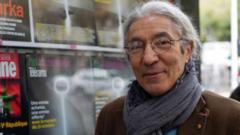Boualem Sansal, an Algerian writer, has been sentenced to five years in prison for allegedly undermining Algeria's territorial integrity through controversial comments. His detention has sparked international support and highlighted the fragile diplomatic relationship between Algeria, France, and Morocco.
Diplomatic Tensions Rise as Algerian Court Sentences Writer for Controversial Remarks

Diplomatic Tensions Rise as Algerian Court Sentences Writer for Controversial Remarks
Boualem Sansal, an 80-year-old Algerian-French author, receives a five-year prison sentence after comments regarding Algeria, France, and Morocco, igniting international debate and highlighting strained relations.
Boualem Sansal, an 80-year-old French-Algerian writer, has been sentenced to five years in prison after making comments deemed by an Algerian court as undermining the country’s territorial integrity. His arrest occurred last year when he stated in an interview with a far-right French media outlet that colonial-era France allocated excessive lands to Algeria while giving insufficient territory to Morocco. Additionally, he hinted that Western Sahara historically belonged to Morocco.
During his time in custody, Sansal's health has declined, requiring hospital treatment. His imprisonment has garnered substantial backlash from various intellectual circles and political figures, including Nigerian Nobel Laureate Wole Soyinka and French President Emmanuel Macron, who said that Sansal's situation and health are critical factors in the restoration of diplomatic confidence between the two countries.
Sansal’s case exemplifies larger tensions in international relations, particularly between Paris and Algiers. His supporters have suggested that Sansal has become an unwitting pawn in this complex diplomatic game. The historical context cannot be ignored: Algeria fought a protracted and bloody war for independence from France, gaining sovereignty in 1962. Since then, the bilateral relationship has been strained, particularly following France’s recent support for Morocco concerning the ongoing dispute over Western Sahara, where Algeria backs the Polisario Front’s quest for independence.
The ruling has drawn attention to the plight of intellectuals in Algeria. Sansal’s lawyer has urged President Abdelmadjid Tebboune to exercise compassion in this case. Known for his anti-Islamist stance, Sansal's views have led him to be branded by some as a favored figure among the far-right, with Marine Le Pen praising him as a "fighter for liberty."
Despite the negative reception from some quarters regarding his political views, Sansal is recognized for his significant literary contributions, such as his acclaimed work "2084," a satire that critiques religious radicalism. His forthcoming novel, "Vivre," is expected to explore themes of colonization in a dystopian future, set against the backdrop of a near-apocalypse on Earth.
This incident reflects not only the controversy surrounding freedom of expression in Algeria but also the broader implications for international relations in North Africa. The ongoing struggle for diplomatic coherence continues, as countries grapple with sensitive historical narratives and current geopolitical dynamics.




















